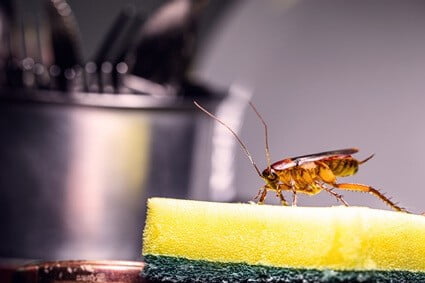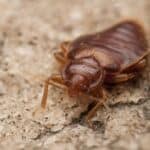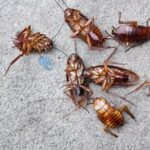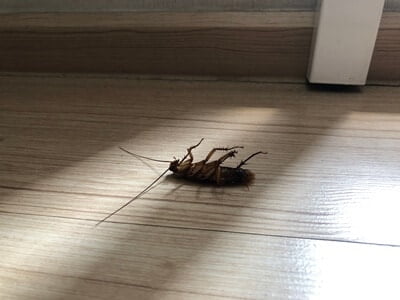Even a spotlessly clean home can fall victim to a cockroach infestation. Cockroaches are versatile pests that are capable of living in extreme environmental conditions. They’ll eat just about anything they find. While they thrive in unsanitary environments, they can make do with the limited food and water located in a clean home.
A clean house may have cockroaches because of where it’s located, how accessible it is, or how secure any food is. Cockroaches can travel from a neighbor’s home or surrounding woodlands, regardless of a home’s tidiness. Any damp and dark areas can attract cockroaches, such as a clean but rarely used bathroom.
While it’s true that securing leftovers is important, don’t blame yourself if cockroaches live in your home. They’ll use unlikely resources to get by and refuse to leave unless forced out by complete starvation. Cockroaches will eat almost anything when they’re desperate, including paper and compromised/rotting wooden furniture.
Why Are Roaches In My Clean House?
The old adage goes that a dirty home attracts cockroaches. While this is true, that doesn’t mean a spotless home will repel cockroaches. Even when maintaining a high standard of cleanliness, you may still find them.
This is not uncommon, and it has nothing to do with how well you clean your living space. Instead, it’s because cockroaches are hardy pests that are capable of thriving in different environments.
They can survive for a month without food and a week when deprived of water. They can even learn to overcome their dislike of the smell of cleaning products, like bleach. They’ll nest in the tiniest of spots, whether or not it’s cluttered. All this means that cockroaches can thrive in a home that’s well-tidied.
Despite being associated with filthy areas, cockroaches often live in clean areas, too. If your clean home has an infestation, here are the reasons why:
Area of Residence
Depending on the region you live in, you may be more prone to infestations than in other locations. For example, if you are a resident in Florida or Georgia, you’re likely to have cockroaches in your home.

Accessibility of Your Home
According to the United States Census Bureau, cockroaches can access any house that has structural problems. For instance, they may enter your home through:
- Holes in the walls made for plumbing and cable pipes
- The space between the floor and exterior door
- Dryer vents
- Gaps in floorboards and window sills
Considering the number of possible entry points for cockroaches, you need to perform a thorough evaluation of the interior and exterior of your home. Seal any entry points that you find.
Damp and Dark Areas
Cockroaches need water to survive. It is this search for water that attracts them to homes. Any leaking pipes or faucets in your house will be targets. Other moist locations include dark corners in laundry rooms and basements.
Check these locations if you suspect you have an infestation. While you’re at it, repair any leaks in pipes and drain any clogs in your plumbing. This will make your home less appealing to cockroaches.
Unsecured Pantry and Kitchen
Cockroaches are mainly attracted to people’s homes when there’s plenty of food. This is true even if you wipe down your kitchen to get rid of food crumbs and clear your trash often. Any unsecured food items lying around in your kitchen counter or pantry can draw in cockroaches.
According to Biomedicine, cockroaches host many kinds of bacteria that cause deadly illnesses to humans. Therefore, it is vital to protect your food from contamination. Always store your food items in tightly sealed plastic containers to ensure that they have no way of accessing them.
Non-Food Items That Cockroaches Eat
Cockroaches don’t entirely depend on food items in kitchens and trash cans to survive. They’ll eat just about anything that’s around them, including:
- Leather
- Paper and cardboard
- Soap
- Animal feces
- Toothpaste
- Human hair
Even if you secure your food, clean your kitchen, and get rid of food waste, these items can lure cockroaches into your home. That’s especially true if you have an abundance, thinking it harmless.
The worst part is that cockroaches can survive for 4 weeks without food. As such, eliminating non-traditional food items may still not properly deter them.
Untidy Landscaping
No matter how clean your house is, if your yard is not well maintained, it can harbor cockroaches. They love to hide in vegetation overgrowths and bushes. These locations provide safety from predators, such as birds and mice. The still water in birdbaths and puddles created by rain provides adequate water to quench their thirst.
If you have piles of wood littered in your yard, this can also create a breeding ground for cockroaches. Keep in mind that cockroaches aren’t picky eaters. Any plant matter, such as leaves and flowers, can supply them with the food they need to survive.
Once the population increases, some cockroaches may move into your house. They’ll find access through tiny holes in your walls, ceilings, and door in search of good nesting spots.
Grimy Surfaces
When people clean their homes, they often fail to wipe down the grease and food spatter stains behind ovens, stoves, and cooking surfaces. This can attract cockroaches, even if the rest of the house is squeaky clean.
How Did Roaches Enter My Clean House?
If you have a cockroach infestation, the chances are that it has little to do with your cleaning ability. Even the tidiest homeowner may have to deal with cockroaches.
Access From Outside
It’s easy for a cockroach to enter your home as they’re highly resourceful. Their small size often plays to their advantage by enabling them to enter people’s homes through:
- Tiny holes and cracks in the walls
- Openings around doors and window sills
Likewise, if you live in a shared apartment building, it is easy for cockroaches to move from one apartment to the next. This is done via pipes and other holes in shared walls.
Carried In
You may have brought a cockroach into your home. This may happen when you travel from your friend’s home, a restaurant, or the office. If a cockroach latches onto your pant leg, shoe, bag, or another area, it can hitch a ride inside.
This can also happen when you purchase second-hand furniture. With one or two cockroaches lingering inside, they can turn into dozens of cockroaches within weeks.
It’s Been Hiding All This Time
If you’ve eradicated the cockroaches in your home, then one is suddenly back, it’s possible you don’t have a new infestation. Instead, this cockroach may have been hiding and avoided your pest control methods.
There are plenty of locations inside a home where roaches can hide. In most cases, they tend to shelter in narrow cracks and crevices in the walls. However, they are also fond of dark corners and damp locations, such as:
- Food cabinets
- Under kitchen sinks
- In bathroom dressers
- Behind fridges
Being aware of the places they’re likely to shelter enables you to narrow down any possible nesting locations. Then, you can take the appropriate measures to get rid of them.

Can Clean Houses Get Cockroaches?
Roaches are not exclusively drawn to untidy and filthy houses., often entering clean homes. All they require is:
- Food
- Water
- Shelter
Since these resources can be found aplenty in all occupied homes, it is no surprise that your tidy abode is hosting cockroaches. These tenacious bugs can overcome your best efforts to maintain a hygienic home.
Of course, there are ways to discourage cockroaches. Fixing any leaking pipes and drains, for instance, cuts off cockroaches from a reliable water supply. This might force them to look elsewhere. Greasy surfaces, food stores, kitchen sinks, and unsecured garbage bins are breeding grounds for cockroaches.
Sealing any openings in your walls, floor, and roof may also reduce the number of entry points that roaches can use. Most importantly, ensure the yard is well maintained, or else it may provide favorable breeding spots for cockroaches. As the population of roaches around your property increases, some may find their way inside your house.
Do Cockroaches Like Clean Houses?
Cockroaches don’t choose hygienic environments. They are decomposers, meaning that their role in nature is to clean up rotting or decaying foods. This includes animal and plant matter and requires a host of bacteria to be present.
Since clean homes don’t have much rot, cockroaches are less likely to select these areas. However, the need for food, water, and shelter can override a cockroach’s preferences. It will make do in a clean home, as long as it can meet its basic needs. Even if these needs are met infrequently, cockroaches will stay put until forced out.
Often, the food, water, and clutter needed for a nest are plentiful in dirty homes. That’s why cockroaches are often associated with unkempt homes. However, as long as cockroaches can get something out of your home, they’ll find their way inside and remain. That’s true whether you clean up regularly or not at all.




